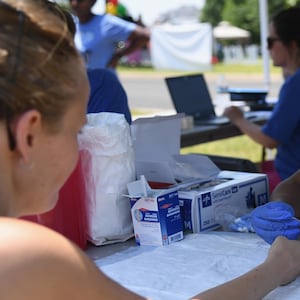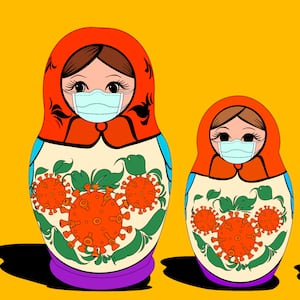After blazing across much of the world, a more aggressive variant of the novel-coronavirus has finally reached the United States. And it’s driving upticks in new cases.
But not everywhere. Vaccines seem to work just fine against Delta. The new variant—“lineage” is the scientific term—is a reckoning, all right. But mostly for poorly vaccinated states.
The new lineage is, in other words, yet another strong argument in favor of getting vaccinated, ASAP.
“The Delta variant will likely become the dominant strain in the U.S. by the end of the summer,” Lawrence Gostin, a Georgetown University global health expert, told The Daily Beast. “It is entirely foreseeable that the U.S. will experience surges, particularly in states with relatively low vaccination coverage.”
Thanks to its sprawling pharmaceutical industry and carefully worded contracts between the vaccine-makers and the federal government, the United States is one of the few countries where supply of vaccine far exceeds willing recipients.
Virtually anyone in the U.S. can get vaccinated, for free, at any time. So far, 54 percent of all Americans have taken advantage of that rare privilege and have gotten at least one dose. But vaccination rates are uneven across U.S. states and, unsurprisingly in this polarized era, map fairly neatly on political alignment.
Vaccine uptake is high in states governed by Democrats. Consider California, where 61 percent of the population is at least partially vaccinated. In Republican states, uptake is generally low. Just 36 percent of Mississippi residents have gotten their first shot.
There’s a politically charged vaccination disparity in the United States, and the Delta lineage is taking advantage of it.
“If you’re vaccinated and in a community where prevalence is low, you’re probably going to be fine,” Irwin Redlener, the founding director of Columbia University’s National Center for Disaster Preparedness, told The Daily Beast. “If you live in Utah, which is one of the states with a low vaccination rate, you are setting yourself up to get very sick from the Delta strain.”
The new variant now accounts for around a quarter of all new infections in the U.S.. But it’s not evenly distributed. Five states where Delta is prevalent—Arkansas, Missouri, Nevada, Utah and Wyoming—are all seeing significant increases in new COVID cases, even though case rates are probably still flat on the national level.
Not coincidentally, Arkansas, Missouri, Nevada, Utah, and Wyoming also have poor vaccination rates by U.S. standards, ranging from 39 percent in Wyoming to 49 percent in Nevada. That’s between 5 and 16 points lower than the country as a whole.
"When you have such a low level of vaccination superimposed upon a variant that has a high degree of efficiency of spread, what you are going to see among undervaccinated regions, be that states, cities or counties, you're going to see these individual types of blips," Anthony Fauci, head of the U.S. National Institute of Allergy and Infectious Diseases, told CNN.
"It’s almost like it’s going to be two Americas," Fauci added.
Chris Beyrer, an epidemiologist at the Johns Hopkins Bloomberg School of Public Health, said he’s especially worried about Southern states. “The Deep South is a real concern, where political leadership was much too slow to endorse the science, and scientific literacy is lower than in many parts of the country,” Beyrer told The Daily Beast. “The more infectious variants, like Delta, will exploit these vulnerabilities. That’s what viruses do.”
SARS-CoV-2, the virus that causes COVID-19, has been steadily evolving since it claimed its first victims in China in late 2019. Delta is one of the latest major lineages. Because it evolved in the face of slowly expanding immunity—vaccine-induced or natural as a result of prior infection—it had to be better than its predecessors in order to survive.
Luckily for the whole human race, Delta didn’t evolve in a way that allows it to evade our vaccines. Instead, it mutated to become more spreadable. The U.S. Centers for Disease Control and Prevention labels Delta, which first appeared in India in December, a “variant of concern” owing to its “increased transmissibility.”
Delta includes several changes to its spike protein, the means by which the coronavirus grabs onto and infects our cells. Studies have found Delta to be up to 60 percent more transmissible than other lineages.
To understand just how transmissible Delta is, consider what has happened in highly vaccinated countries where Delta is already dominant.
The United Kingdom is one of the most vaccinated countries in the world, with 67 percent of its population having received at least one dose. New infections had bottomed out at around 1,900 a day in late May—then Delta showed up. Now the country is logging 17,600 new infections a day, and rising. It’s officially a fourth wave for the U.K.
“Cases have risen exponentially, particularly among unvaccinated populations,” Duncan Robertson, a policy analyst at the U.K.’s Loughborough University, told The Daily Beast. “This is predominantly in children and young people, the least likely to be vaccinated.”
“There are also differential vaccine rates in ethnic minority communities and more deprived communities,” Robertson added.
Israel is another highly vaccinated country with a Delta problem: 62 percent of Israelis are at least partially vaccinated; the other 38 percent were fair game when Delta arrived. Daily new infections increased 30-fold between early and late June.
If the American experience is anything like the British and Israeli ones, daily new infections could start rising again—not just in a few under-vaccinated states, but nationwide. Much of the progress the country has made against the novel coronavirus in recent months could evaporate, and fast.
If there’s a silver lining for Israel and the United Kingdom—and potentially the United States —it’s that Delta has increased cases without sending a lot of people to hospital or killing them. Yet.
To be clear, that’s not the case in under-vaccinated countries. In Russia, where just 15 percent of the population has gotten jabbed, Delta swiftly became the dominant lineage. Since late May, the country’s daily case rate has doubled to nearly 20,000. A month ago, around 375 Russians were dying of COVID every day. Now around 575 are dying daily.
Experts aren’t sure why Delta infects but doesn’t kill a lot of people in vaccinated countries, although some have theories. Because older people are more vulnerable to the novel coronavirus and older people also tend to get vaccinated at a high rate, the virus has been deprived of its most vulnerable targets.
The people who are most likely to be unvaccinated, and thus more likely to catch Delta, are young. And younger people tend to weather COVID infections better than seniors. “Overall, we won't see our hospitals overwhelmed the way they were in the past,” Gostin predicted.
On the other hand, younger people tend to mix more than their older peers. “Spread will be rapid among these groups,” Edwin Michael, an epidemiologist at the Center for Global Health Infectious Disease Research at the University of South Florida, told The Daily Beast.
Delta might not make its initial targets very sick or have a very good chance at killing them, but its quick spread among people who might never bother getting vaccinated gives SARS-CoV-2 a lifeline in countries that otherwise were doing a pretty good job suppressing the pathogen.
Delta is bad. But what comes after Delta, as the virus continues to mutate, might be even worse. Indian geneticists have already identified a sublineage of Delta they call “Delta Plus,” which has evolved to add an extra spike protein. Scientists aren’t sure yet whether Delta Plus is more dangerous than its parent lineage.
Epidemiologists are clamoring for more information on Delta and its possible spin-offs. “Stronger surveillance and transparency with provision of data... including genomic surveillance [and] data on variants, will be key for assessing and managing this stage of the pandemic,” Michael said.
But there’s a problem on that front. Some state leaders in the U.S. are acting like the pandemic is over—and have stopped releasing pandemic-related data. Even more worryingly, some of these states are also poorly vaccinated and thus more likely to suffer big outbreaks that could incubate even worse new lineages.
If Delta leads to new lineages in undervaccinated states and those states don’t share data, we might not know until it’s too late to stop the new lineages causing their own surges in cases.
“The decision by some state governments, including Florida, to stop publishing daily case [and] vaccination data on their dashboards is a major step backwards,” Michael said. Experts find themselves half-blind as Delta takes hold across the United States, with potentially devastating consequences.
But as always, the best solution to the myriad problems the new lineage represents is also the easiest—for Americans, at least.
Take a few hours out of your day and get vaccinated.









